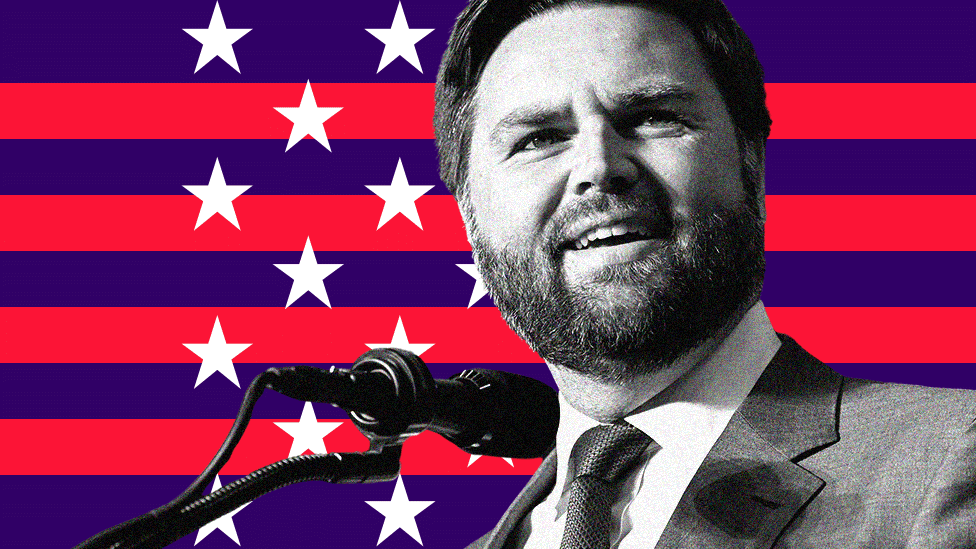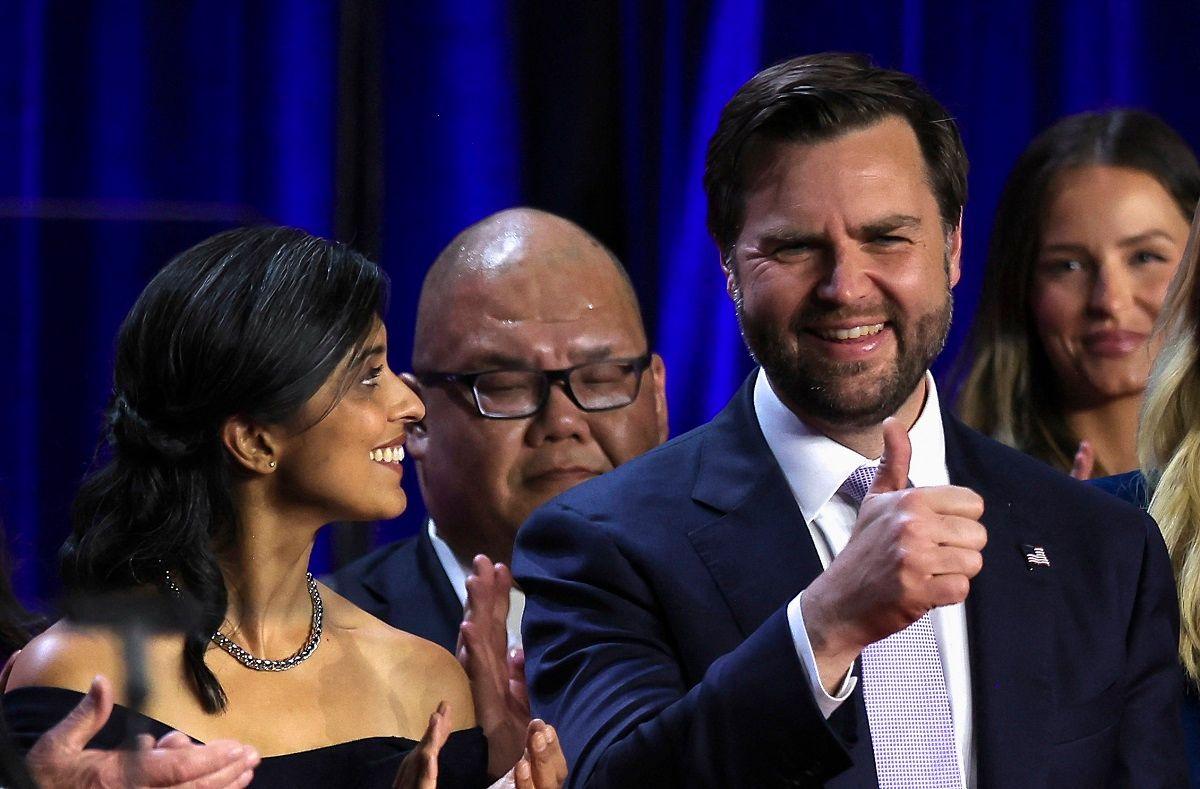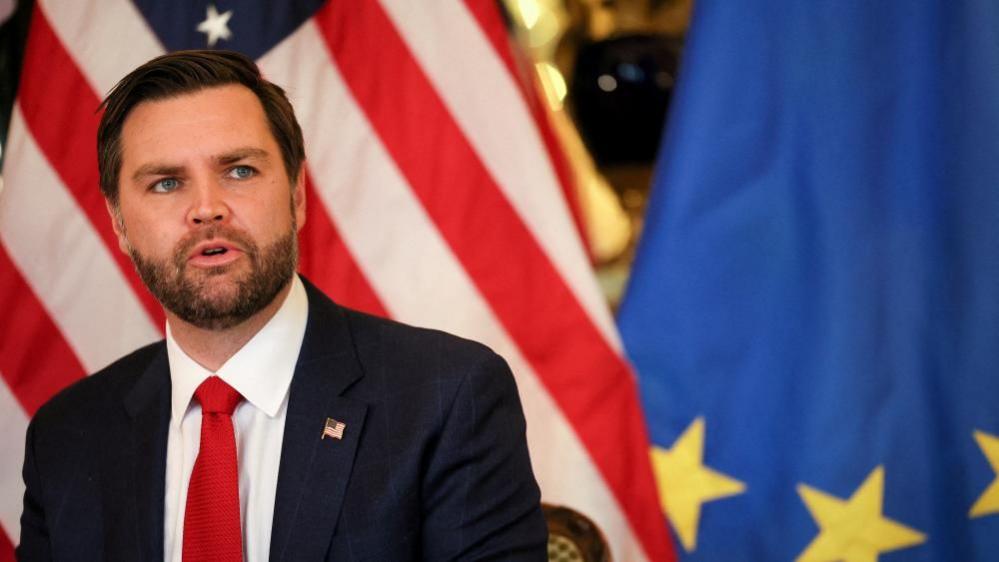JD Vance: The 'hillbilly' Maga loyalist who became vice-president

- Published
US Vice-President JD Vance is no stranger to transformation.
Vance grew up in poverty, but went on to Yale Law School and rubbed shoulders with Silicon Valley elites before turning his life story into a politically tinged memoir which championed conservative values.
He is a former US Marine who served in Iraq as a military journalist before becoming a sharp critic of American involvement overseas.
And having once said he was a "never-Trump guy", he took office as Trump's deputy - and a steadfast Maga (Make America Great Again) loyalist.
His current job also makes him the early frontrunner in the 2028 presidential race, when Trump will no longer be able to run under rules set out in the US Constitution.
Trump, 78, is the oldest person ever to be sworn in as US president, and 40-year-old Vance is - as an old phrase goes - just a heartbeat away from the top job.
But now the former Ohio Senator and self-described "hillbilly" faces perhaps his biggest test - keeping in with Trump and forging a role in the administration when Elon Musk has sucked up much more attention than the president's elected second-in-command.
The pitfalls are obvious. The last Republican Vice-President, Mike Pence, dared to stand up to Trump by refusing to overturn the duo's 2020 election loss.
Pence's subsequent bid to run for president crashed and burned, and he is now persona non grata in the Maga world.
Vance will hope to avoid the same fate. And his recent lecturing of US allies - including a fiery confrontation with Ukrainian President Volodymyr Zelensky in the Oval Office - point to a possible role he may fill as vice-president, that of an aggressive champion of "America first" foreign policy.
A best-selling memoir
Vance was born James Donald Bowman in Middletown, Ohio, to a mother who struggled with addiction and a father who left the family when JD was a toddler.
He was raised by his grandparents, “Mamaw” and “Papaw”, whom he sympathetically portrayed in Hillbilly Elegy, published in 2016.
A revolving cast of father figures - he changed his surname several times - and his mother's drug abuse issues resulted in a chaotic childhood, and he found refuge in Mamaw's house.
When he married, both JD and his wife Usha took the last name of Vance to honour his maternal grandparents' family name - leading to his current name: James David Vance.
Middletown is located in rust-belt Ohio, but Vance identified closely with his extended family’s roots to the south.
Appalachia is a vast mountainous inland region that stretches from the Deep South to the fringes of the industrial Midwest and north-east. Largely but not exclusively white, it includes some of the country’s poorest areas, where jobs are scarce and drugs and violence are abundant.
In Hillbilly Elegy, Vance painted a personal portrait of the trials, travails and bad decisions of family members, neighbours and friends. While criticising outsiders for looking down on the "hillbillies" of the book's title, he took a distinctly conservative view, describing his own people as chronic spendthrifts, dependent on government welfare payments and mostly failing to work hard and pull themselves up by their tattered bootstraps.
He wrote that he saw Appalachians “reacting to bad circumstances in the worst way possible” and that they were products of “a culture that encourages social decay instead of counteracting it”.
“The truth is hard,” he wrote, “and the hardest truths for hill people are the ones they must tell about themselves.”
By the time the book came out - with near-perfect timing in the thick of the 2016 presidential race - Vance’s own bootstrap-tugging had slung him far away from Middletown. His stint in the US Marines including a tour of duty in Iraq was followed by college at Ohio State University and Yale Law School, then a job as a venture capitalist in California.
Hillbilly Elegy not only made him into a bestselling author, but a sought-after commentator who was frequently called upon to explain Donald Trump’s appeal to white, working-class voters.
His verdict on Trump was damning - and definitive. Some quotes from the time:
“I’m a 'never Trump' guy. I never liked him.”
“My god what an idiot.”
“I find him reprehensible.”
As he promoted his book, and along with it a mix of sympathy for the working class and conservative values, Vance rarely missed an opportunity to criticise the then-Republican nominee.
“I think this election is really having a negative effect especially on the white working class," he told an interviewer in October 2016.
"What it’s doing is giving people an excuse to point the finger at someone else, point the finger at Mexican immigrants, or Chinese trade or the Democratic elites or whatever else.”
Ironically, those are exactly some of the themes that he himself would go on to regularly raise eight years later, as Trump's running mate.
Watch: JD Vance's journey from 'Never Trumper' to VP pick
From venture capital to politics
Vance and his wife Usha, who he met at Yale, have three children - Ewan, Vivek and Mirabel.
Usha Vance had a posher upbringing than her husband, growing up in a suburb of San Diego as the child of Indian immigrant academics. In addition to her Yale history and law degrees, she has a master's from the UK's University of Cambridge.
She served as a clerk to Supreme Court Chief Justice John Roberts and most recently worked for Munger, Tolles & Olson, a firm that a leading legal journal described as "progressive" and "woke". Mrs Vance resigned from her job shortly after her husband was selected by Trump to be the VP nominee.
In 2017, in the early years of the first Trump term, Vance and his family returned to Ohio after several years of living on the US coasts.
At the same time, whispers about Vance's possible foray into politics - bolstered by his newfound fame - grew. And several years later, Vance saw an opportunity when Ohio’s Republican Senator Rob Portman decided not to run for re-election in 2022.

Vance's wife Usha introduced him at the Republican National Convention and has been at his side during public events including Trump's election night party in Florida
Although his campaign was initially slow to get going, it got a kick-start via a $10m (£7.7m) donation from his former boss, Silicon Valley powerbroker Peter Thiel.
His rhetoric shifted, and he spent less time talking about the failures of hillbillies and more about those of elites, the "woke" and Democrats. He began appearing on Fox News, but to drum up support, he also popped up on fringier political outlets - including the right-wing Newsmax network and niche podcasts and YouTube channels.
Many of the controversial clips which would later resurface during the 2024 presidential campaign date from around the time his Senate campaign was starting to gain traction.
At one point he told then-Fox News host Tucker Carlson that the United States was being run by "a bunch of childless cat ladies who are miserable at their own lives and the choices that they've made and so they want to make the rest of the country miserable, too." Vance later called his remark "dumb" but said he was trying to make the point that "our country has become almost pathologically anti-child".
However the real hurdle stopping him from getting elected to the Senate was his past criticism of Trump.
Vance remained a Trump sceptic as late as 2020, according to text messages obtained by the Washington Post. Then, he wrote that the president had "thoroughly failed to deliver on his economic populism (excepting a disjointed China policy)". And he correctly predicted that Trump would lose the presidency - although he would later endorse false claims that Trump actually beat Joe Biden.
Eventually, though, he found himself on a path back to Maga. During the 2022 Senate campaign, Vance apologised for his previous public criticism of Trump and earned an endorsement, pushing him to the top of the Republican field and eventually into the Senate.
Where does he stand on the issues?
During his short tenure in the Senate, Vance was a reliable conservative vote, backing populist economic policies and emerging as one of the biggest congressional sceptics of aid to Ukraine - a role he would continue to play in the second Trump administration.
Democrats were in the majority during his time in Congress, muffling any impact that a freshman Republican senator might hope to have, however Vance proposed legislation to withhold federal funds from colleges that allow protests against Israel's war in Gaza or employ undocumented immigrants.
At a speech in July 2024 at the National Conservatism Conference, an increasingly influential gathering of right-wing and far-right leaders from around the world, he argued that American involvement in Ukraine had "no obvious conclusion or even objective that we’re close to getting accomplished".
At the same conference, he said the UK was "not doing so good" because of immigration and claimed that under a Labour government, the country would become the “first truly Islamist country” with a nuclear bomb.
Just days later, during the Republican National Convention, Trump tapped Vance for the VP nomination.
He received a rapturous welcome when he entered the venue in Milwaukee, appearing slightly in awe as he was greeted by the party faithful.
Once out on the campaign trail, he established himself as an attack dog, relentlessly criticising the opposition and engaging with reporters in combative Q&A sessions at rallies and on cable TV shows.
He continued to attract controversy, spreading baseless rumours about Haitian immigrants eating pets, which caused huge upheaval in Springfield, a city not far from Vance's hometown in Ohio.
During a CNN interview, Vance explained that he felt the need to "create stories so that the... media actually pays attention to the suffering of the American people”.
He insisted that constituents had told him stories of pet-eating by immigrants, even though he did not elaborate and his Senate office did not respond to the BBC's requests for details.
He also shifted his views on abortion policy. A Catholic convert, Vance had at one time expressed support for a nationwide abortion ban after 15 weeks of pregnancy. He later backed Trump's view that the matter should be left up to individual states to decide.
Vance as VP

During the whirlwind first weeks of Trump's second term, Vance gave staunch backing for his boss's plans to reshape and scale back government - and questioned the authority of US judges to stand in the way.
But Vance was often overshadowed by Trump's cost-cutting tsar Elon Musk and his attempts to take a wrecking ball to multiple government departments.
The vice-president has had more of an impact on foreign policy. He made his debut on the world stage with a trip to Europe, during which he berated US allies at the Munich Security Conference. Vance accused European leaders of censoring free speech, taking in too many immigrants and undermining democracy.
Then in late February came the argument in the Oval Office, during a meeting that went off the rails after Vance interjected to praise Trump's diplomacy and slam the previous Democratic administration.
Watch in full: The remarkable exchange between Zelensky, Vance and Trump
Zelensky replied by outlining the recent decade including repeated Russian violations of ceasefire agreements and pointedly asked the vice-president: "What kind of diplomacy, JD, [are] you are speaking about?"
The conversation devolved from there, with Vance accusing Zelensky of disrespect.
"Have you said thank you once?" Vance demanded, as the Ukrainian president pointed out that he had thanked Americans on numerous occasions.
It was a return to Vance's loyal attack-dog style seen on the campaign trail.
As for the future, Trump was asked in a February interview broadcast before the Super Bowl if he viewed Vance as his successor.
"No," Trump said, before explaining that at this stage, the Republican 2028 field is still wide open. "But he's very capable… it's too early, we're just starting."
The reward for Vance's loyalty could be huge. But the vice-presidency is no sure ticket to the top job. Just ask Kamala Harris – or Mike Pence.